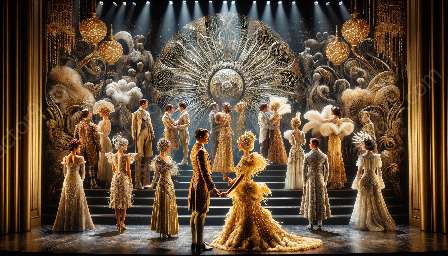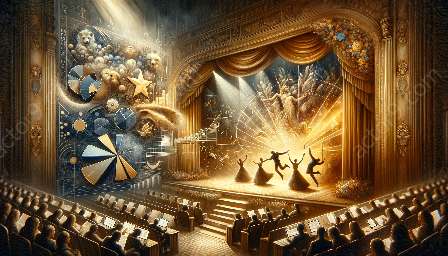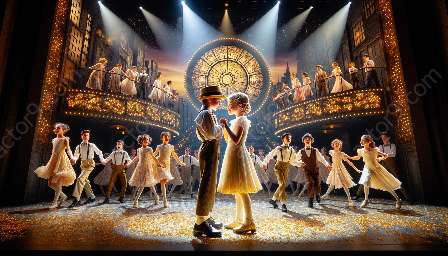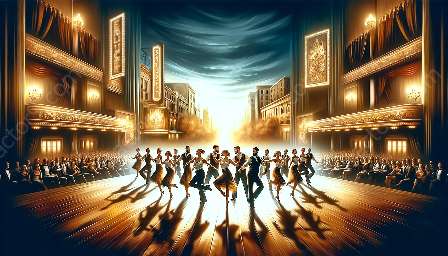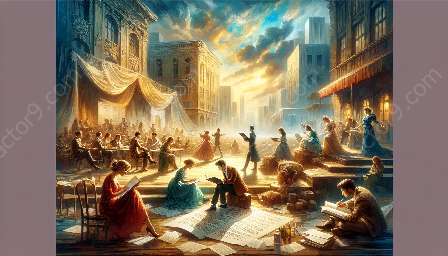Musical theater has long been recognized as a powerful platform for addressing social issues, offering a unique and impactful way to engage audiences in critical topics. At the heart of this impactful medium lies music, which plays a pivotal role in conveying the emotional depth and social commentary that define Broadway musicals. In this exploration, we will delve into the ways in which music in musical theater contributes to the storytelling of social issues, examining the impact of Broadway musicals on societal discourse and change.
The Role of Music in Conveying Emotions
One of the fundamental ways in which music contributes to the storytelling of social issues in musical theater is through its ability to convey emotions. The emotional resonance of music is unparalleled, capable of evoking empathy, contemplation, and introspection among the audience. In the context of social issues, the power of music to elicit emotional responses serves as a catalyst for raising awareness and prompting action. Through poignant melodies, stirring lyrics, and powerful orchestrations, music in Broadway musicals has the power to humanize complex social issues, making them relatable and accessible to audiences.
Engaging Audiences in Critical Discussions
Broadway musicals serve as a communal experience, bringing together diverse audiences to witness compelling narratives unfold on stage. Music serves as the common thread that binds these narratives, allowing audiences to engage with the storytelling of social issues in a visceral and captivating manner. By integrating music with thought-provoking narratives, Broadway musicals have the ability to spark critical discussions and introspection among audiences. The emotional impact of music amplifies the resonance of social issues, prompting individuals to consider the broader societal implications and complexities inherent in these issues.
Shaping Perceptions and Promoting Empathy
Music in musical theater serves as a transformative tool for shaping perceptions and promoting empathy towards social issues. Through the emotive power of music, Broadway musicals have the capacity to shift perspectives, challenge stereotypes, and foster empathy for individuals and communities impacted by social issues. By humanizing the experiences depicted on stage through music, audiences are encouraged to cultivate a deeper understanding and compassion for the complexities inherent in social issues. As a result, music in musical theater becomes a catalyst for fostering empathy and understanding, driving audiences to reflect on their own role in effecting positive change.
Amplifying the Impact of Social Commentary
Social commentary lies at the heart of many Broadway musicals, offering incisive critiques of contemporary societal norms and injustices. Music in musical theater serves as a dynamic vehicle for amplifying the impact of this social commentary, infusing it with emotional depth and nuance. Through captivating melodies and compelling lyrics, music enhances the poignancy and urgency of societal critiques, propelling audiences to confront uncomfortable truths and contemplate avenues for societal change. In doing so, music in musical theater becomes a potent instrument for igniting meaningful conversations around social issues.
Encouraging Activism and Advocacy
Music in Broadway musicals functions as a call to action, encouraging audiences to become advocates for social change. By imbuing narratives with persuasive melodies and impassioned performances, musical theater empowers audiences to consider their own agency in addressing social issues. The compelling nature of music fosters a sense of solidarity and determination, inspiring individuals to translate their emotional responses into tangible acts of activism and advocacy. From sparking conversations to mobilizing efforts, music in musical theater ignites a sense of purpose and responsibility, prompting audiences to engage in meaningful action towards social change.
Conclusion
In conclusion, music in musical theater stands as a transformative force in shaping the storytelling of social issues within the realm of Broadway musicals. By evoking emotions, engaging audiences in critical discussions, shaping perceptions, amplifying social commentary, and inspiring activism, music serves as a vital conduit for advancing societal dialogue and fostering positive change. As we continue to explore the intersection of music and social issues in Broadway musicals, it becomes evident that the contribution of music to the storytelling of social issues is both profound and enduring, solidifying the central role of musical theater in driving meaningful discourse and societal transformation.







